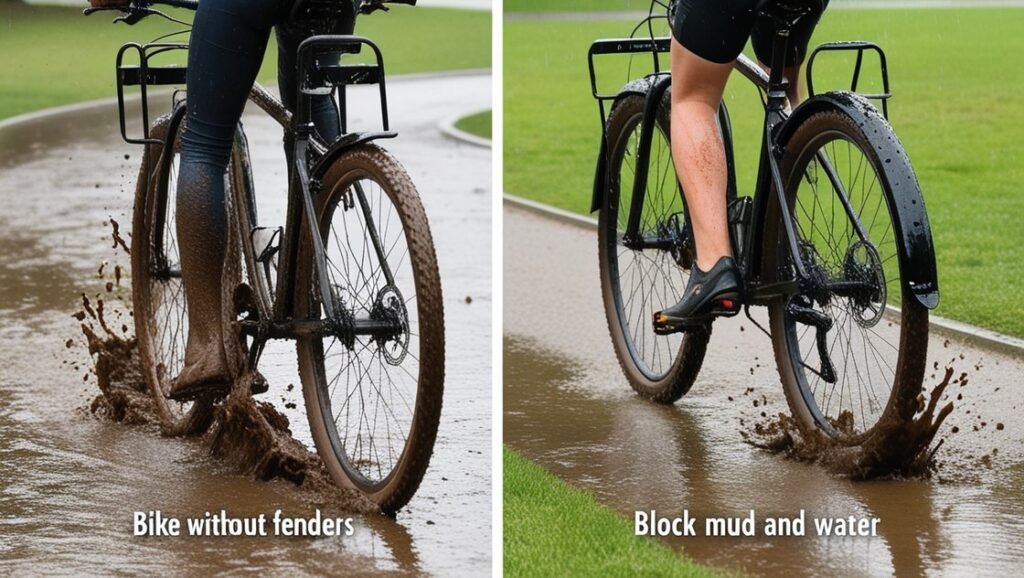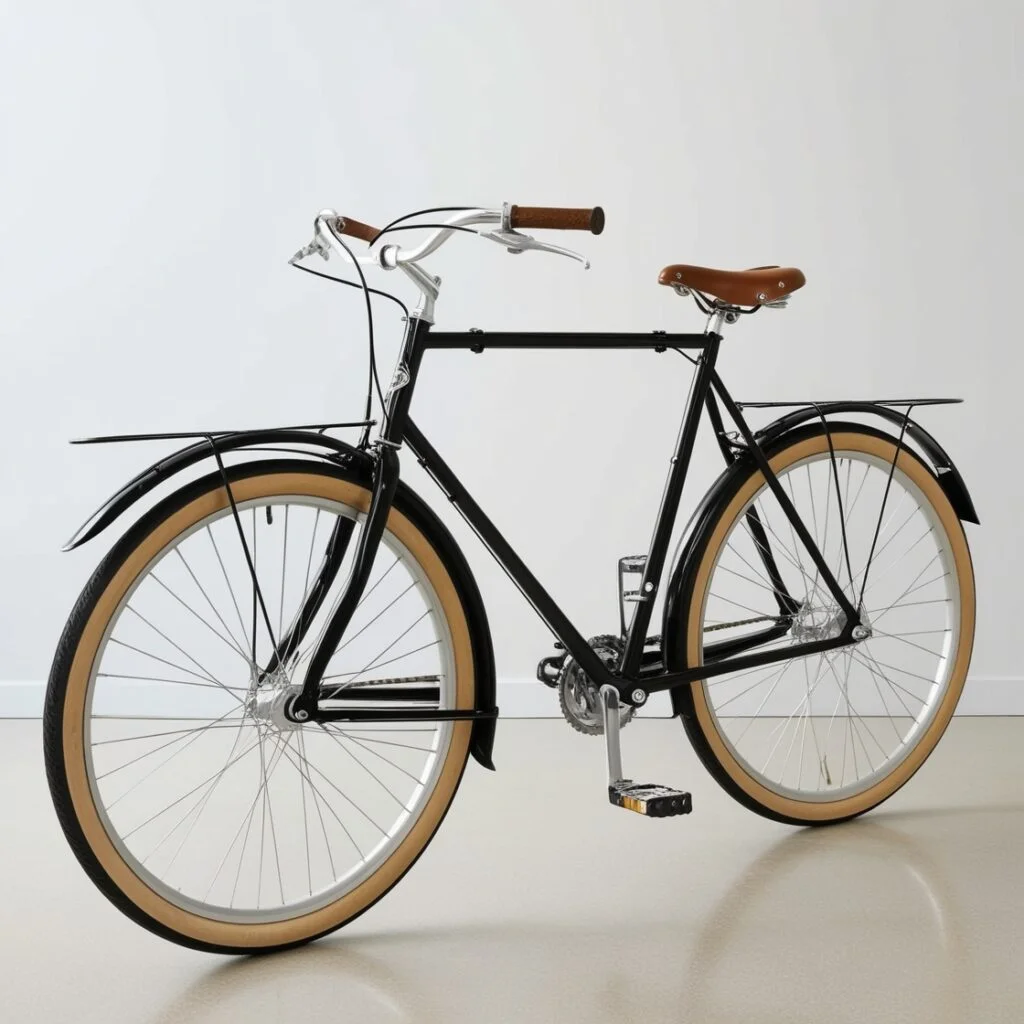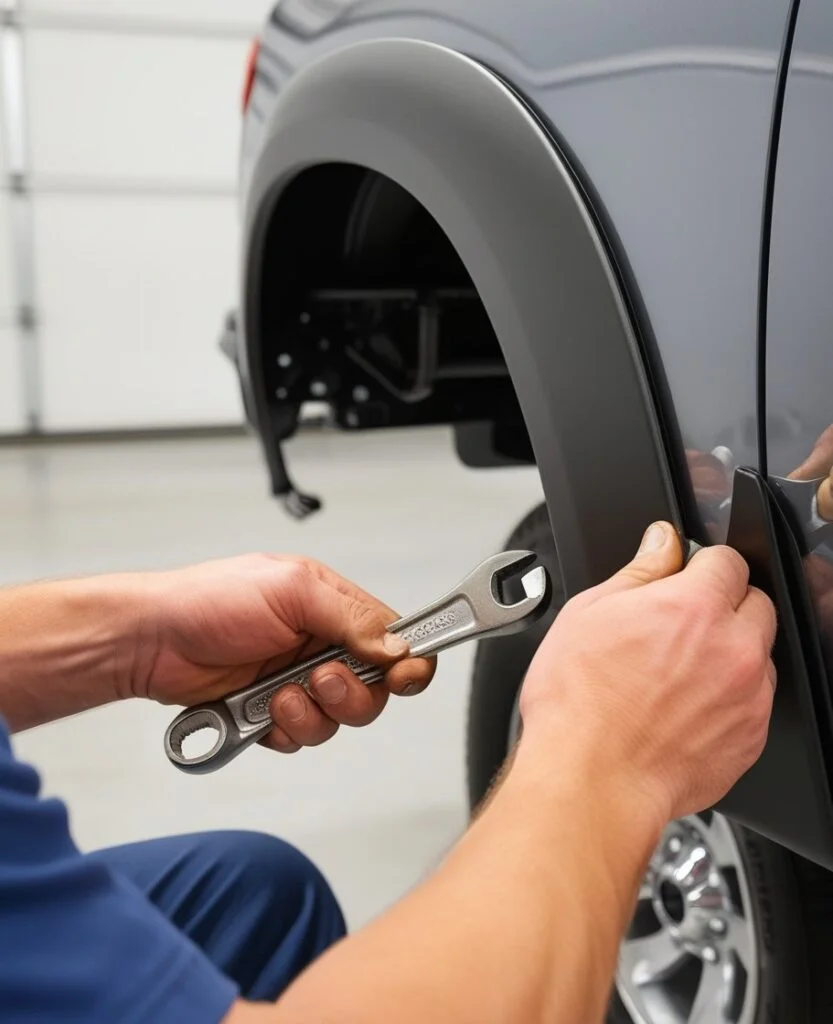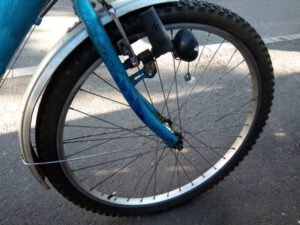When cycling, comfort and performance depend on how well you’re prepared for road or trail conditions. Many cyclists wonder, “Do bike fenders work?” Whether you’re commuting in the rain, navigating muddy trails, or trying to keep your bike clean, fenders offer practical benefits. They can significantly improve your riding experience.
Fenders prevent water, mud, and road debris from being thrown up by your tires. This keeps both you and your bike clean. This protection is especially helpful in wet or muddy conditions. Staying clean and dry can make your ride more enjoyable and safer.
But are bike fenders necessary for everyone? That depends on your riding style, the weather you typically encounter, and how much you value cleanliness while riding.
How Do Bike Fenders Work?
Bike fenders work by creating a physical barrier between your tires and everything the road or trail throws at them. As you ride, your tires naturally pick up water, mud, and debris from the surface.
Without fenders, tires fling mud and water onto you, your clothes, and your bike. With fenders, they deflect that dirt and water, keeping both you and your bike cleaner and safer.
You mount fenders just above your bike’s tires, typically using clamps or bolts. They sit close to the tire without rubbing against it, which ensures smooth movement. As the tire spins, the fender catches any spray that would normally end up on your legs, back, or face.
Example: Let’s say you are cycling through a rainy park. Without fenders, you’d likely have a streak of muddy water running up your back. But with fenders, all that spray is blocked, leaving you cleaner and more comfortable when you arrive at your destination.
Fenders also protect your bike’s sensitive parts. Water and mud can wear down your drivetrain, clog up the gears, and even cause rust over time. By blocking this debris, fenders reduce the wear and tear on your bike, saving you money on repairs and maintenance.

Do Fenders Work on All Types of Bikes?
One of the best features of fenders is their versatility. You can fit them on nearly any type of bike, from sleek road bikes to rugged mountain bikes. However, the type of fender you choose will depend on the kind of bike you have and the conditions you typically ride in.
- Fenders for Road Bikes
For road cyclists, fenders are designed with aerodynamics in mind. Road bikes prioritise speed and a lightweight build, so fenders for these types of bikes are usually narrow, lightweight, and sleek. They often sit close to the tire to maintain the bike’s slim profile.
Many modern road bikes come with quick-release or clip-on fenders, which are easy to install and remove based on the weather. This flexibility allows riders to enjoy their ride without worrying about weight or drag affecting performance.
- Fenders for Mountain Bikes
Mountain bikes typically require more robust, durable fenders that can handle the harsh conditions of off-road trails. Mud, rocks, and debris are common obstacles for mountain bikers, and the wider tires of these bikes often demand fenders with greater coverage and sturdier construction.
Clip-on fenders are a popular choice for mountain bikers because they are easy to attach and remove depending on the trail conditions. Many MTB fenders also feature adjustable angles to prevent tire rub and ensure the best protection for both rider and bike.
Tip: If you ride on mixed terrain, consider fenders that offer more clearance for larger tires. This will prevent the fenders from getting clogged with mud or interfering with the tire’s movement.
- Specialised Fenders for Unique Bikes
Certain types of bikes, such as gravel bikes, touring bikes, or fat-tire bikes, may require specialised fenders. Fat bikes, for instance, have extremely wide tires that need fenders with extra width to fully protect the rider.
Gravel and touring bikes often favour full-length fenders for maximum protection during long-distance rides in varying weather conditions.
These types of fenders typically attach securely to the frame and provide more consistent coverage, ensuring both you and your bike are shielded from dirt and debris.
The Impact of Fenders on Bike Performance
For most riders, bike fenders have minimal to no effect on performance. In fact, they can sometimes improve your ride by providing additional protection without noticeable drawbacks.
Modern technology designs fenders to be lightweight and aerodynamic. For example, manufacturers craft most road bike fenders from materials like plastic or aluminium, making them nearly unnoticeable in weight. These fenders streamline to fit the sleek profile of road bikes, ensuring they don’t create extra drag.
Example: Imagine cycling in the rain without fenders. Your tires kick up water and mud, causing discomfort and slowing you down as you get distracted and soaked. But with fenders, you stay dry and focused, improving your overall riding experience.
For mountain bikers, fenders do add a bit more bulk since they need to be sturdy enough to handle rough conditions. However, any added weight is typically negligible, especially compared to the benefit of keeping mud and debris off the bike’s suspension and drivetrain.
Overall, while fenders do add a small amount of weight to your bike, they don’t significantly affect speed or performance for most cyclists. Instead, they help you ride more comfortably and protect your bike from wear and tear.
The Necessity of Bike Fenders for Different Types of Riders
Fenders can be incredibly useful, but are they necessary for everyone? The answer depends on the type of riding you do and the conditions you face. If you’re someone who rides mostly in dry conditions or fair weather, you may not need fenders at all. However, if you ride in areas with frequent rain, mud, or unpredictable weather, fenders can be a game changer.
- For Commuters: If you’re commuting to work or school, fenders are almost essential. No one wants to show up to the office or class with a muddy back or soaked clothes. Fenders ensure you stay dry and clean, no matter what conditions you encounter on the road.
- For Mountain Bikers: If you enjoy off-road trails, fenders can be incredibly helpful in keeping mud and debris off your face and bike. This not only keeps you cleaner but also protects your bike from dirt getting into the gears, chain, and suspension, which can cause costly damage over time.
- For Casual Weekend Riders: If you only ride on sunny weekends or dry days, fenders might not be a high priority for you. Clip-on fenders can be a great solution here—they’re easy to attach when the weather turns bad and remove when the sun is out. This gives you flexibility depending on your needs.
In short, fenders aren’t necessary for every rider, but they provide significant benefits for those who ride in varying weather conditions or want to protect their bike and themselves from the elements.
Pros and Cons of Using Bike Fenders
Just like any other bike accessory, bike fenders come with both benefits and drawbacks. Understanding these pros and cons can help you decide whether they’re a good fit for your riding style and conditions. Here’s a breakdown of what you can expect from using bike fenders, so you can make the best decision for your needs.
| Pros | Cons |
| Keeps You and Your Bike Clean: Fenders block water, mud, and debris from splashing up, helping keep both you and your bike clean. This reduces the need for frequent washing and maintenance. | Added Weight: While modern fenders are lightweight, they still add a bit of bulk to your bike, which might not appeal to performance-focused cyclists. |
| Protects Bike Components: Fenders help prevent mud and water from damaging critical parts of your bike, such as the drivetrain and chain, which can extend your bike’s lifespan. | Aesthetic Concerns: Some cyclists feel that fenders disrupt the sleek, minimalist look of their bikes, particularly on road or racing bikes. |
| Improves Visibility and Safety: By keeping your face and eyes clean from mud splashes, fenders help you maintain better visibility, reducing the risk of accidents. | Potential Rattling or Noise: If not installed properly, fenders can rattle or make noise, which can be distracting during a ride. |
| Better Comfort in Wet Weather: Fenders make wet rides more comfortable by keeping your clothes dry, allowing you to stay focused on the ride rather than on getting soaked. | Not Needed in All Conditions: If you mostly ride in dry conditions, fenders might not be necessary, making them an extra expense without much use. |
Are Bike Fenders Worth the Investment?
After exploring how bike fenders work, it’s clear that they can be a great investment for many cyclists. Whether you’re navigating rainy streets or muddy trails, fenders can make your ride more comfortable by keeping both you and your bike clean.
If you frequently cycle in wet, muddy, or unpredictable weather, fenders can be a game changer. They help keep you and your bike cleaner, which means less hassle when you arrive at your destination and less wear and tear on your bike.
Without fenders, water, mud, and debris kicked up by the tires can leave you soaked and dirty. Fenders, however, keep the mess off you and your bike.
For city commuters, fenders can be essential. They ensure you arrive at work or any destination without mud streaks on your back or water-soaked shoes. Even for casual riders who don’t often face bad weather, fenders can be useful on those rare rainy days.
Conclusion:
Bike fenders might seem like a small accessory, but their impact on your ride can be significant. So, do bike fenders work? For anyone regularly riding in wet or muddy conditions, fenders provide protection that keeps you clean, dry, and comfortable. They also extend the life of your bike by preventing dirt and water from damaging its components, making them a worthwhile investment for many cyclists.
If you primarily ride in dry weather or prioritise speed and a minimalist bike setup, fenders may not be necessary. However, the option of using clip-on fenders provides flexibility, allowing you to adapt to changing weather conditions without committing to permanent fenders.
Ultimately, whether you’re a commuter, a weekend rider, or a mountain biker, choosing the right fender for your bike and riding conditions can make all the difference. Fenders are a practical, easy-to-install solution that can enhance your cycling experience and protect your bike for the long haul.
Frequently Asked Questions (FAQs):
1. Are fenders good on a bike?
Yes, fenders are great! They keep you and your bike clean by blocking water, mud, and debris, making your rides more comfortable and enjoyable.
2. Are bike mudguards worth it?
Definitely! If you ride in wet or muddy conditions, mudguards (fenders) can save you from getting soaked and dirty. They also help protect your bike from wear and tear.
3. How do bike fenders work?
Bike Fenders work by creating a barrier between your tires and the ground. As your tires roll, they kick up water and mud, but fenders deflect this mess away from you and your bike.
4. How important is a fender?
Fenders can be very important, especially if you often ride in rainy or muddy conditions. They enhance comfort, visibility, and bike longevity by protecting crucial components.
5. Why don’t modern bikes have mudguards?
Some modern bikes, especially racing models, skip fenders to maintain a sleek, lightweight design. Cyclists who prioritize speed often choose to ride without them.
6. Why cycle without a mudguard?
Some riders prefer to cycle without mudguards for aesthetic reasons or because they mostly ride in dry conditions. It ultimately depends on personal preference and riding style.






